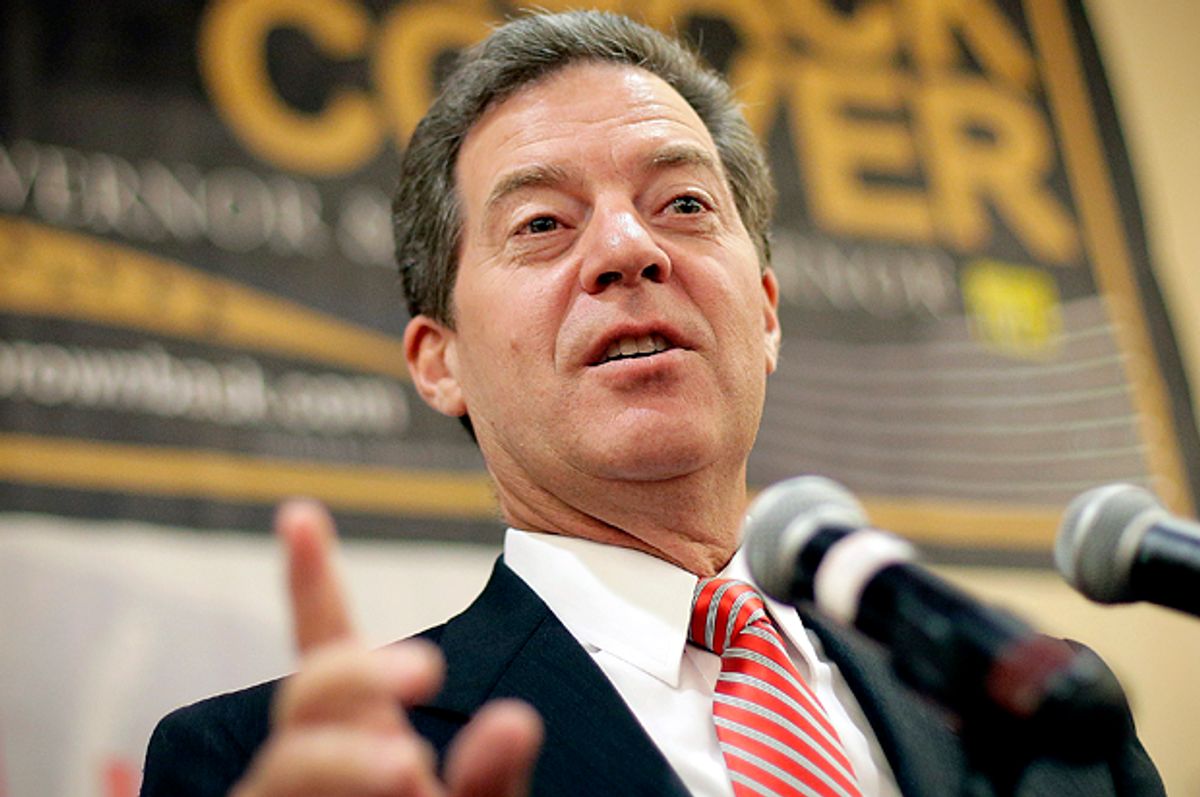TOPEKA, Kan. (AP) — Kansas Gov. Sam Brownback's signature personal income tax cuts emerged mostly intact from a grueling legislative fight to close a budget deficit that arose after revenue failed to match the conservative governor's predictions of an economic boom.
Brownback and his GOP allies managed to avoid backtracking on past reductions on income tax rates. But they had to slow down future rate cuts with the proviso that if revenues grow they could be restored. And they agreed to a small tweak to business tax breaks that are a central plank of his strategy to spur growth.
Instead, they raised the state's sales tax to one of the highest rates in the nation and smokers will be paying 50 cents more for each pack of cigarettes. Republican legislators cobbled together a mix of tax policies to both balance the budget and attract just enough votes for passage, but it's not yet clear whether they've created long-term fiscal stability.
Brownback's allies engineered a more conservative Legislature in 2012 elections, ousting most of the moderate state senators who'd resisted his push to slash personal income taxes. Those political successes boomeranged this year, as Republicans, who dominate the Legislature, repeatedly said it was not in their DNA to raise taxes and disagreements among multiple GOP factions made the annual session the longest in state history, at 113 days.
The Republican governor gained national attention for the state's aggressive tax cuts and touted his experiment as a model for other states - and perhaps the federal government in Washington. Less than a year after Brownback was narrowly re-elected by assuring skeptical voters that economic growth would preserve funding for schools and government programs, his aides warned GOP lawmakers that draconian cuts would result if they didn't pass tax increases to backfill the budget gap.
Kansas found itself in such a deep budget hole because the tax cuts implemented in 2013 initially led to a steep fall in revenue that has still not reversed as much as Brownback had hoped. For the fiscal year beginning next month, the state estimated in mid-April that it would face a shortfall of 12 percent of its general fund budget.
"Taxes matter, but so does responsible budgeting," said Joseph Henchman, a vice president at the Washington-based nonpartisan but conservative-leaning Tax Foundation. "You can't just cut taxes and keep your spending the way it is and expect some sort of magic to balance it."
Other states struggled this year with budget problems, several after cutting taxes in previous years, including Louisiana, Oklahoma and West Virginia. Louisiana lawmakers raised their state's cigarette tax, scaled back business tax breaks and raised a fee on car dealers.
Two bills approved by Kansas legislators in the waning hours of their session will raise $384 million during the fiscal year beginning July 1, to avert a deficit prohibited by the state constitution. The sales tax will rise to 6.5 percent from 6.15 percent and the cigarette tax will jump to $1.29.
Democratic state Sen. David Haley, of Kansas City, publicly wished Republican colleagues well in trying to explain to voters one of the largest tax increases in state history.
"Personally, I'm going to miss serving with some of you, because I doubt they'll return you," he said.
Republicans who pushed the plan said its tax increases have to be seen in the context of the income tax cuts in 2012 and 2013, which the Legislature's top tax analyst said could be worth $900 million annually.
GOP lawmakers are likely to make that point repeatedly in seeking re-election next year. Republican senators briefly hashed over possible campaign talking points in a meeting before their last crucial vote and also are likely to argue that the state has suffered because the national economy is not yet robust.
"We're saying, `Wait a minute, we probably overdid this a little bit and we're running short of money,' not necessarily because of what's going on in the state," Senate tax committee chairman Les Donovan, a Wichita Republican, told his colleagues.
The plan approved by Republican legislators contained a modest income tax increase for 281,000 business owners and 53,000 farmers who stopped paying income taxes on their profits under a 2012 policy championed by Brownback. But the increase represents about 11 percent of the tax break they received - and critics suggested it will be relatively easy to avoid.
Brownback said in a statement that GOP legislators' plan "keeps the state on a path of economic growth, creating well-paying jobs."
Mike O'Neal, the president and CEO of the Kansas Chamber of Commerce and a former House speaker, said afterward that the state remains on Brownback's promised "march to zero" income taxes.
"Sometimes your legacy is not fully appreciated until after you're gone," O'Neal said of Brownback, who is term-limited and will leave office in January 2019.
But Henchman predicted in an online posting after legislators' final vote on the package that they'll be addressing budget gaps in future years.
Matthew Gardner, executive director of the left-leaning, Washington-based Institute on Taxation and Economic Policy said Kansas' experience makes it more difficult for other states to pursue aggressive income tax cuts. In South Carolina, Republican Gov. Nikki Haley couldn't pass income tax cuts even after declaring, "We are not doing what Kansas did."
"It's clearly a cautionary tale for other states to have in mind," Gardner said.



Shares